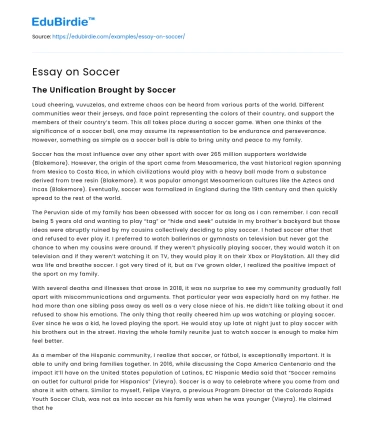The Unification Brought by Soccer
Loud cheering, vuvuzelas, and extreme chaos can be heard from various parts of the world. Different communities wear their jerseys, and face paint representing the colors of their country, and support the members of their country’s team. This all takes place during a soccer game. When one thinks of the significance of a soccer ball, one may assume its representation to be endurance and perseverance. However, something as simple as a soccer ball is able to bring unity and peace to my family.
Soccer has the most influence over any other sport with over 265 million supporters worldwide (Blakemore). However, the origin of the sport came from Mesoamerica, the vast historical region spanning from Mexico to Costa Rica, in which civilizations would play with a heavy ball made from a substance derived from tree resin (Blakemore). It was popular amongst Mesoamerican cultures like the Aztecs and Incas (Blakemore). Eventually, soccer was formalized in England during the 19th century and then quickly spread to the rest of the world.
Save your time!
We can take care of your essay
- Proper editing and formatting
- Free revision, title page, and bibliography
- Flexible prices and money-back guarantee
The Peruvian side of my family has been obsessed with soccer for as long as I can remember. I can recall being 5 years old and wanting to play “tag” or “hide and seek” outside in my brother’s backyard but those ideas were abruptly ruined by my cousins collectively deciding to play soccer. I hated soccer after that and refused to ever play it. I preferred to watch ballerinas or gymnasts on television but never got the chance to when my cousins were around. If they weren’t physically playing soccer, they would watch it on television and if they weren’t watching it on TV, they would play it on their Xbox or PlayStation. All they did was life and breathe soccer. I got very tired of it, but as I’ve grown older, I realized the positive impact of the sport on my family.
With several deaths and illnesses that arose in 2018, it was no surprise to see my community gradually fall apart with miscommunications and arguments. That particular year was especially hard on my father. He had more than one sibling pass away as well as a very close niece of his. He didn’t like talking about it and refused to show his emotions. The only thing that really cheered him up was watching or playing soccer. Ever since he was a kid, he loved playing the sport. He would stay up late at night just to play soccer with his brothers out in the street. Having the whole family reunite just to watch soccer is enough to make him feel better.
As a member of the Hispanic community, I realize that soccer, or fútbol, is exceptionally important. It is able to unify and bring families together. In 2016, while discussing the Copa America Centenario and the impact it’ll have on the United States population of Latinos, EC Hispanic Media said that “Soccer remains an outlet for cultural pride for Hispanics” (Vieyra). Soccer is a way to celebrate where you come from and share it with others. Similar to myself, Felipe Vieyra, a previous Program Director at the Colorado Rapids Youth Soccer Club, was not as into soccer as his family was when he was younger (Vieyra). He claimed that he would prefer playing a handheld game instead of watching the soccer game on television like his father insisted he should (Vieyra). As he grew older, he began appreciating the sport more and more due in large part to realizing how close it was connected to his cultural identity. This was a realization I also had myself.
While many believe soccer can bring unification, it is not always seen this way. In some cases, it can enhance separation. It can bring rivalries amongst countries. It may bring unity to my community but not to others. Some take soccer so very seriously that they don’t realize they are showing hatred towards another country. For instance, one example of a soccer rivalry would be Real Madrid vs. Barcelona. While some may think of this as a healthy sports rivalry it is not necessarily always that way. The FC Staff from ESPN discusses how Luis Suarez, a member of the Barcelona team, is said to have wily gamesmanship and physical combativeness. Additionally, they also mention how Sergio Ramos is said to be very aggressive during games, especially during games, especially in an attempt to take down Lionel Messi. People with a negative perspective of soccer may take this as an example of why it is not a sport that brings unification. They may think it exhibits aggressiveness and the need to always win.
In summary, Soccer is able to merge my family into a more unified and joyful community. While I never considered myself to be a soccer fan, I will always appreciate the effect it has on my family. It was able to bring my father out of a difficult time in his life and my family was able to come together to deal with the horrible circumstances of 2018 in the best way possible. It’s impractical for everyone to enjoy the sport or to think of it as a positive influence, but to my community, it is essential to keep us together.
Works Cited
- Vieyra, Felipe. “Cultural Significance of Soccer in the Latino Community - CRYSC.” Colorado Rapids Youth Soccer Club, 16 Jan. 2017, rapidsyouthsoccer.org/cultural-significance-of-soccer-in-the-Latino-community/.
- Staff, FC. “The Hater's Guide to Soccer Rivalries.” ESPN, ESPN Internet Ventures, 28 Feb. 2019, www.espn.com/sports/soccer/story/_/id/26063197/the-hater-guide-soccer-rivalries.
- Blakemore, Erin. “Where Did Soccer Start? Archaeology Weighs In.” National Geographic, 18 June 2018, www.nationalgeographic.com.au/history/where-did-soccer-start-archaeology-weighs-in.aspx.






 Stuck on your essay?
Stuck on your essay?

